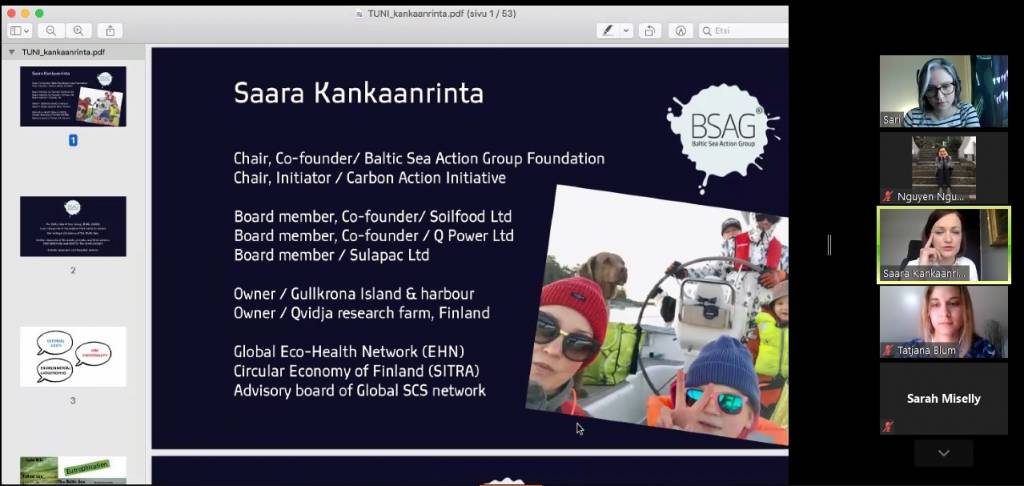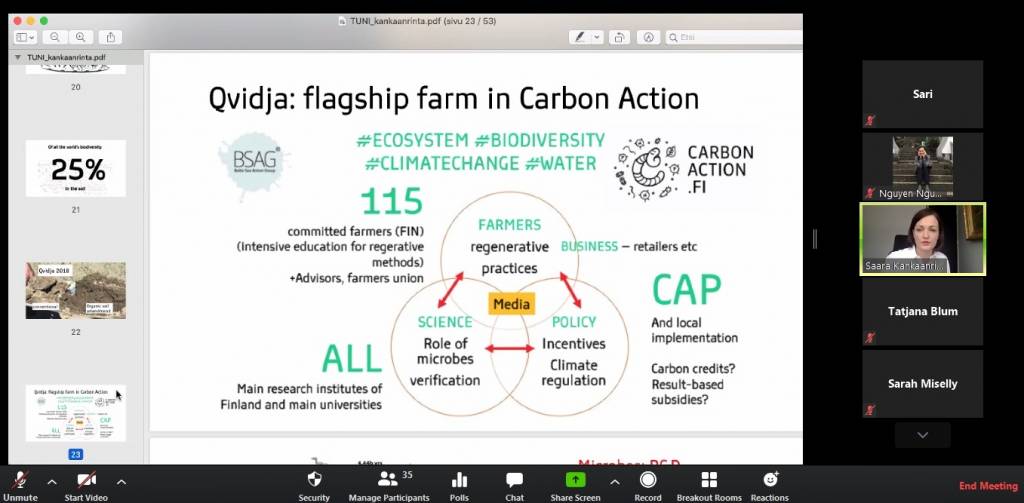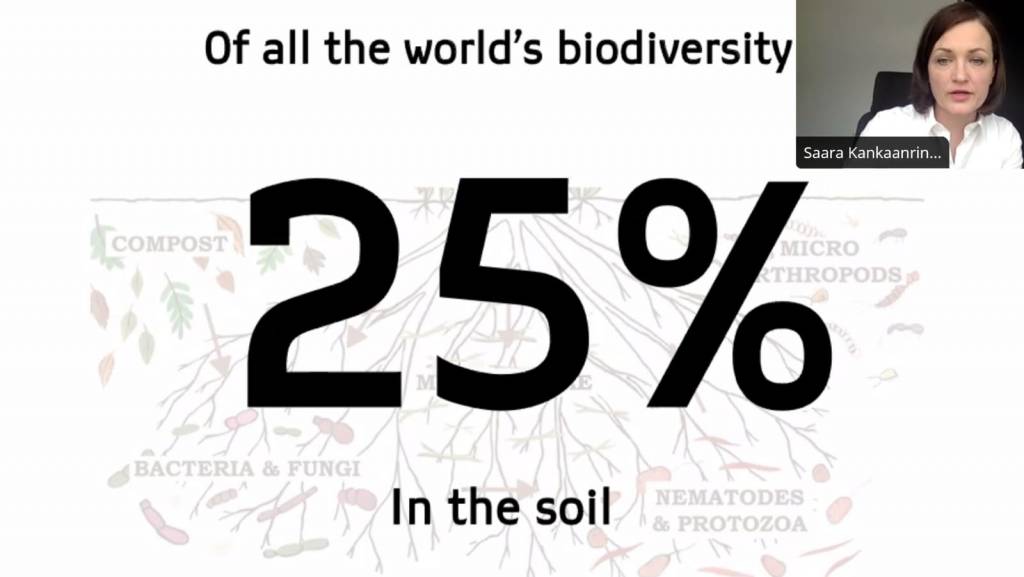 On April 24, we had the pleasure to listen to a lecture by Saara Kankaanrinta, who is an environmental influencer with many tools and says that “everything I do, is for the nature and for the Baltic Sea”. Kankaanrinta is involved in the Baltic Sea Action Group (BSAG), which is an independent foundation aiming to restore the ecological balance of the Baltic Sea by uniting resources of the public, private and third sectors. She is also one of the founders of the Qvidja Farm, that is addressing climate-related issues with a holistic and systematic approach, which will be introduced in more detail below.
On April 24, we had the pleasure to listen to a lecture by Saara Kankaanrinta, who is an environmental influencer with many tools and says that “everything I do, is for the nature and for the Baltic Sea”. Kankaanrinta is involved in the Baltic Sea Action Group (BSAG), which is an independent foundation aiming to restore the ecological balance of the Baltic Sea by uniting resources of the public, private and third sectors. She is also one of the founders of the Qvidja Farm, that is addressing climate-related issues with a holistic and systematic approach, which will be introduced in more detail below.
Same Problem, Different Name
Why do we need to change the paradigm? There are many reasons for that. Economists would say that external costs are the problem, since in many industries they are high, causing a big challenge. Farmers would say that the challenge lies in low profitability; environmentalists say that the problem is a possible global catastrophe. At this point, it must be clear for all that the climate change and the problems in the current paradigms touch us all, and that is why specialists from different sectors are needed to find the right solutions.
The Problem
In all cases, intensive, or effective, agriculture causes eutrophication. This process results from a situation in which there is too much nutrients in the sea, feeding the algae, not the soil. In farming, Saara Kankaanrinta argues, the efficient (or intensive) farming does more harm than good to the soil. The soil is an important carbon storage, since 2/3 of all the carbon is stored underground. At the moment, the problem with the soil is that its carbon storage is decreasing, not increasing as it should.
But why is this happening? Saara Kankaanrinta gave four reasons for that: monocultures, inorganic fertilizers, tilling, and pesticides. Monocultures require heavy pesticide use, because monocultures as ecosystems are so weak that they need to be externally supported. As a result, the number of insects has decreased 80% in the last 30 years. Factory farming and antibiotics used on animals are also a big problem. A functioning ecosystem needs biodiversity, and when the diversity is lost, it’s hard to go back and nature stops working the way it should. Loss of biodiversity is more severe than the climate change, even if it is not such a big news at the moment. However, Saara Kankaanrinta might have a solution for that: Qvidja Farm.
Qvidja Farm – “Animals are Co-operators, not Meat Production Units”
Kankaanrinta is one of the co-founders of the Qvidja farm, which could be described as a pilot farm with an ecosystem approach. At the farm, they are trying to mimic the nature (e.g. only grass-fed animals, rotational grazing, organic soil amendments, and fertilizers). As Saara says, “it’s not the cow, but how”. Since the climate change is a worldwide problem, it underlines the fact that everything is interconnected. That’s why a holistic and systematic approach to solve the issue is needed. In their Qvidja farm, they are trying to create sustainable farming by giving nature space to work and increasing the quality of the soil.

It’s All in the Soil
Healthy soil stores carbon, and good soil is the key. Farmers are not the problem; they are the solution. There are several reasons why the soil is not working: monocultures, tilling, inorganic pesticides, etc. The soil is “tube-fed”, as Saara says; when the microbes in the soil are not working, the soil does not have a chance to do its magic. The soil is important for the biodiversity also, since 25% of all the world’s biodiversity is there.
The good news is that improving the soil is neither expensive or complicated. There are a lot of microbes in the soil, and the nature has worked by itself for ages. Even a small change can have a big impact and even a small change matter. Saara has highlighted the need for a holistic approach before, and also with the soil-issue, that’s what’s lacking. In Finland, together with the Carbon Action Platform (one of Saara Kankaanrinta’s tools) they have gathered 115 committed Finnish farmers with different backgrounds to act as pilot farms, who together with universities, research institutes and business partners aim to create better soil and implement methods of farming that protects the soil, increases biodiversity and most importantly, it increases the nutrients and carbon storage underground.

When it comes to the soil, at the moment Finland is the “pilot country”; hiwever, the methods of the Carbon Action Platform are already partly used in the US and Australia, and in farming training. Kankaanrinta argues that there is no systematic way yet; however, even a small change is better than nothing.
How Is It Done?
How did they succeed in this, and what is the way to success? How can others do the same? Basic research is important when innovating – before you apply for funding, you should have done your research well. You have to have enough data to support your views. You also need solution-oriented outsiders, who want to solve something and also good values, because you want to do good. We need to have “the freedom to try, fail, and try again”: this is the path to innovations.
As an example, Saara Kankaanrinta noted the paradigm change they have progressed with in farming: they found the root cause of the problem and formed a detailed diagnosis. They also acknowledged the interconnectedness of everything: there is a need for professionals of different fields. Based on the diagnosis, the strategy was formed, which included collaboration with different actors. In the process, leadership is needed, and everyone must be willing to learn.
For new innovations that aim to shift the paradigm, media attention is important. They had contacted the media and they had visibility in the newspapers too. This can be linked to consumers and consumption habits that, naturally, must change too. When asked about this, Kankaanrinta mentioned that deepening the understanding of the consumers and putting a price on everything harming the nature is important.
When asked about politics and other driving forces, Kankaanrinta said that the COVID-19 situation is a good example: the politicians are able to do big changes in a short amount of time, if needed. To solve big problems such as the climate change, we need brave politics, i.e. changing the economy towards a regenerative paradigm and putting limits to capitalism so that the resources of the nature are not exceeded.
There are some challenges too, Saara says. She mentioned that the big challenges in her work are that there are different stakeholders, who see things differently. She said that being able or learning to communicate in the right way with each party is extremely important. It’s crucial to understand the interests of different stakeholders and find ways to communicate with them.
“If the standard seems to be set too high, it’s probably set right”, Kankaanrinta concluded. The big problems such as the climate change can seem as something unbeatable; however, we need to aim high. Saara Kankaanrinta and her work act as an inspiration to all of us who want to lead the change: there is a possibility to solve the unsolvable too.


Comments